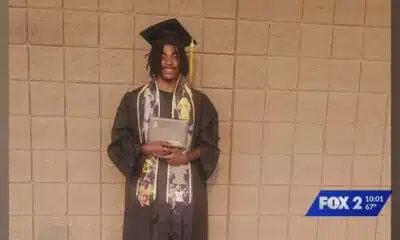News from the South - West Virginia News Feed
Trump again tries to defund NPR and PBS, sparking a new congressional battle
by Jennifer Shutt, West Virginia Watch
May 9, 2025
WASHINGTON — President Donald Trump urged Congress to eliminate funding for the Corporation for Public Broadcasting during his first term, but was largely unsuccessful.
Now, in his second go-around, Trump is once again asking lawmakers to scrap federal spending on the private, nonprofit corporation that Congress established in the 1960s.
The Corporation for Public Broadcasting allocates funding to National Public Radio, or NPR, and the Public Broadcasting Service, or PBS, as well as more than 1,500 local radio and television stations throughout the country.
Trump’s renewed focus on public media — in his budget proposal, an executive order and an expected rescissions request — has led the organizations that benefit from the CPB to start talking more than they have in recent years about their funding and their journalism.
Katherine Maher, president and CEO of NPR, rejected the idea that ending funding for the CPB would have a significant impact on the federal ledger, since the “appropriation for public broadcasting, including NPR and PBS, represents less than 0.0001% of the federal budget.”
Maher also opposed what she viewed as the Trump administration seeking to influence journalists and news organizations.
“The President’s order is an affront to the First Amendment rights of NPR and locally owned and operated stations throughout America to produce and air programming that meets the needs of their communities,” Maher wrote in a statement. “It is also an affront to the First Amendment rights of station listeners and donors who support independent news and information.”
Paula Kerger, CEO and president at PBS, also defended the CBP as well as the news programs that receive its funding.
“There’s nothing more American than PBS, and our work is only possible because of the bipartisan support we have always received from Congress,” Kerger said. “This public-private partnership allows us to help prepare millions of children for success in school and in life and also supports enriching and inspiring programs of the highest quality.”
NPR receives about 1% of its direct funding from the Corporation for Public Broadcasting, while PBS receives about 15%. Those numbers fluctuate for the local stations, which tend to get more, but not all, of their operating budgets from CPB funding.
Senate likely to balk
House Republicans, who have sought to zero out funding for the Corporation for Public Broadcasting in recent appropriations bills, are likely to get on board. But senators, who write broadly bipartisan bills, haven’t taken that step and appear unlikely to do so this year — possibly helping public media resist Trump’s cutback attempts, as it did during his first term.
The differences between the House and Senate will lead to heated debate for months to come about future spending on the Corporation for Public Broadcasting as well as the dozens of other programs Trump told lawmakers to stop funding in his budget request.
Wisconsin Democratic Sen. Tammy Baldwin, ranking member on the panel that funds CPB, told States Newsroom during a brief interview she hopes lawmakers “can effectively fight back against that proposed budget.”
“I find that some of my Republican colleagues, especially those from rural states, hear from their constituents that they are reliant on public broadcasting, especially radio for local information, news, etcetera,” Baldwin said. “And there’s not a lot of other radio resources out there. But I think the same can be said about the public television offerings.”
Opinions among Republicans vary, though.
Louisiana Republican Sen. John Kennedy, who sits on the spending panel, said funding for CPB “may have made sense at one time, but the American taxpayer has no business spending half a billion dollars a year subsidizing media.”
Kennedy said he doesn’t expect rural residents will lose access to local television and radio programming should Congress eliminate the funding.
“Rural communities have the same access as everybody else to cable, to streaming, to getting their news off of this thing,” Kennedy said, pointing to his cell phone. “It’s just an argument by the Corporation for Public Broadcasting to hold on to a government subsidy.”
Alaska Republican Sen. Lisa Murkowski, a senior member of the Appropriations Committee, pushed back against defunding.
She wrote in an op-ed published in the Fairbanks Daily News-Miner that while she shares “the desire to reduce government spending, defunding the CPB, and particularly the essential reporting it allows locally owned radio and television stations to provide in Alaska, is not the place to start.”
Alaska’s local stations received $12 million last year from CPB, which made up between 30% and 70% of their total budget, in addition to individual donation and state funding, according to the op-ed.
“Not only would a large portion of Alaska communities lose their local programming, but warning systems for natural disasters, power outages, boil water advisories, and other alerts would be severely hampered,” Murkowski wrote. “What may seem like a frivolous expense to some has proven to be an invaluable resource that saves lives in Alaska.”
CPB has a state-by-state breakdown on its website detailing how much it provided during each of the past six years. The individual profiles show what portion of each state’s funding went to different programs, like the Next Generation Warning System, radio programming, Ready to Learn and Television Community Service Grants.
Public media among multiple Trump targets
Trump’s skinny budget request, released last week, calls on Congress to cease funding the CPB as well as dozens of other organizations, including the National Endowment for Democracy and the Low Income Home Energy Assistance Program, or LIHEAP.
The section on CPB says the request is “consistent with the President’s efforts to decrease the size of the Federal Government to enhance accountability, reduce waste, and reduce unnecessary governmental entities.”
Trump has also signed an executive order directing the CPB Board of Directors as well as executive departments and agencies to halt funding NPR and PBS.
The order stated that the “viewpoints NPR and PBS promote does not matter. What does matter is that neither entity presents a fair, accurate, or unbiased portrayal of current events to taxpaying citizens.”
Patricia Harrison, president and CEO of the Corporation for Public Broadcasting, wrote in a statement responding to the executive order that Trump didn’t have the authority he was trying to wield.
“CPB is not a federal executive agency subject to the President’s authority,” Harrison wrote. “Congress directly authorized and funded CPB to be a private nonprofit corporation wholly independent of the federal government.
“In creating CPB, Congress expressly forbade ‘any department, agency, officer, or employee of the United States to exercise any direction, supervision, or control over educational television or radio broadcasting, or over [CPB] or any of its grantees or contractors…’ 47 U.S.C. § 398(c).”
There are also several news reports that the Trump administration will send a rescissions request to Capitol Hill, asking lawmakers to pull back funding already approved for CPB. But the Office of Management and Budget hasn’t yet taken that step.
The Corporation for Public Broadcasting received steady funding from Congress starting at its founding, before the last Trump administration asked lawmakers to phase out its appropriation.
The last Trump administration’s first budget request called on lawmakers to “conduct an orderly closeout” by providing $30 million for CPB that would have gone toward salaries, rent and other costs.
The proposal argued that “private fundraising has proven durable, negating the need for continued Federal subsidies.”
“Services such as PBS and NPR, which receive funding from the CPB, could make up the shortfall by increasing revenues from corporate sponsors, foundations, and members. In addition, alternatives to PBS and NPR programming have grown substantially since CPB was first established in 1967, greatly reducing the need for publicly funded programming options.”
Funding increased despite Trump
Congress didn’t go along with the fiscal 2018 budget request for the CPB, and it wouldn’t for the rest of Trump’s first term.
In March 2018, lawmakers approved $445 million, followed by the same amount in the next year’s bill. Congress then lifted spending to $465 million in December 2019 and then again just before Trump left office for a total funding level of $475 million.
Those allocations continued rising during the Biden administration, reaching a $535 million appropriation in March 2024, the last full-year spending law enacted before Trump returned to the Oval Office.
House Republicans did, however, try to phase out funding for CPB during the second half of President Joe Biden’s term. The House GOP provided a two-year advanced appropriation until 2023, when Republicans announced they wanted “the Corporation for Public Broadcasting to compete with other programs in the bill for annual funding.”
Those efforts didn’t work and the final spending bill, which became law in March 2024, included funding for CPB.
Senate Democrats wrote after negotiating the bipartisan agreement that it “protects funding for the Corporation for Public Broadcasting to support more than 1,500 locally owned TV and radio stations nationwide—rejecting House Republicans’ proposal to zero out funding and weaken Americans’ access to local reporting.
“The bill maintains a critical investment of $60 million for digital interconnection and $535 million as a two-year advance appropriation, of which roughly 70% is provided directly to local public TV and radio stations.”
Final resolution far off
Congress is expected to begin work on its dozen annual appropriations bills sometime this summer, which collectively total about $1.8 trillion and make up about one-third of all federal spending.
The House Appropriations Committee will likely propose phasing out CPB funding, or at least its advanced appropriation, in its bill.
The Senate Appropriations Committee tends to write more bipartisan bills, so as long as several of the panel’s members advocate for CPB in its funding measure, the program will likely receive its advanced funding in that bill.
Final agreement between the House and Senate is supposed to come before the start of the next fiscal year on Oct. 1. But that rarely happens and lawmakers often use a stopgap spending bill to push off final negotiations until mid-December.
That’s likely the earliest this year the Corporation for Public Broadcasting and those who rely on it will learn if Congress will reduce or eliminate its funding. That is, unless lawmakers fail to reach agreement on that particular funding bill.
Congress would then have to use a stopgap spending bill, which mostly keeps funding levels on autopilot, until it can enact a full-year bill.
West Virginia Watch is part of States Newsroom, a nonprofit news network supported by grants and a coalition of donors as a 501c(3) public charity. West Virginia Watch maintains editorial independence. Contact Editor Leann Ray for questions: info@westvirginiawatch.com.
The post Trump again tries to defund NPR and PBS, sparking a new congressional battle appeared first on westvirginiawatch.com
Note: The following A.I. based commentary is not part of the original article, reproduced above, but is offered in the hopes that it will promote greater media literacy and critical thinking, by making any potential bias more visible to the reader –Staff Editor.
Political Bias Rating: Centrist
This content presents a balanced overview of the debate surrounding funding for the Corporation for Public Broadcasting (CPB). It includes multiple perspectives from both sides of the political spectrum — statements from Republican officials supporting defunding CPB, Democratic officials defending it, and commentary on the fiscal impact and societal benefits. The article maintains a neutral tone, focusing on facts, quotes, and legislative processes without showing evident favoritism toward either political side, thus positioning it in the centrist category.
News from the South - West Virginia News Feed
Katie's Full Forecast for August 26
SUMMARY: Katie’s full forecast for August 26 predicts cool, crisp mornings with temperatures in the high 40s to low 50s, about 8 to 10 degrees cooler than yesterday. Daytime highs will warm into the low to mid-60s, below the average 80 degrees, offering comfortable and beautiful weather. Light northwest winds are expected with little chance of gusts. Overnight lows remain cool, with river fog likely in some areas. Rain chances are minimal this week, making it ideal for outdoor activities like washing your car. The UV index remains high despite mixed clouds and sun, so sunscreen is recommended. Labor Day weekend promises mild temperatures in the low 70s and mostly dry conditions.
FOLLOW US ON FACEBOOK AND TWITTER:
https://facebook.com/WOAYNewsWatch
https://twitter.com/WOAYNewsWatch
News from the South - West Virginia News Feed
AI is making it easier for bad actors to create biosecurity threats
by Paige Gross, West Virginia Watch
August 26, 2025
Artificial intelligence is helping accelerate the pace of scientific discovery, but the technology also makes it easier than ever to create biosecurity threats and weapons, cybersecurity experts say.
It’s an issue that currently flies under the radar for most Americans, said Lucas Hansen, cofounder of AI education nonprofit CivAI.
The COVID-19 pandemic increased awareness of biosecurity measures globally, and some instances of bioterrorism, like the 2001 anthrax attacks, are well known. But advancements in AI have made information about how to create biosecurity threats, like viruses, bacteria and toxins, so much more accessible in just the last year, Hansen said.
“Many people on the face of the planet already could create a bio weapon,” Hansen said. “But it’s just pretty technical and hard to find. Imagine AI being used to [multiply] the number of people that are capable of doing that.”
It’s an issue that OpenAI CEO Sam Altman spoke about at a Federal Reserve conference in July.
“We continue to like, flash the warning lights on this,” Altman said. “I think the world is not taking us seriously. I don’t know what else we can do there, but it’s like, this is a very big thing coming.”
AI increasing biosecurity threats
Hansen said there’s primarily two ways he believes AI could be used to create biosecurity threats. Much less common, he believes, would be using AI to make more dangerous bioweapons than have ever existed before using technologies that enable the engineering of biological systems, such as creating new viruses or toxic substances.
Second, and more commonly, Hansen said, AI is making information about existing harmful viruses or toxins much more readily accessible.
Consider the polio virus, Hansen said. There are plenty of scientific journals that share information on the origins and growth of polio and other viruses that have been mostly eradicated, but the average person would have to do much research and data collection to piece together how to recreate it.
A few years ago, AI models didn’t have great metacognition, or ability to give instructions, Hansen said. But in the last year, updates to models like Claude and ChatGPT have been able to interpret more information and fill in the gaps.
Paromita Pain, an associate professor of global media at the University of Nevada, Reno and an affiliated faculty member of the university’s cybersecurity center, said she believes there’s a third circumstance that could be contributing to biosecurity threats: accidents. The increased access to information by people not properly trained to have it could have unintended consequences.
“It’s essentially like letting loose teenagers in the lab,” Pain said. “It’s not as if people are out there to willingly do bad, like, ‘I want to create this pathogen that will wipe out mankind.’ Not necessarily. It’s just that they don’t know that if you are developing pathogens, you need to be careful.”
For those that are looking to do harm, though, it’s not hard, Hansen said. CivAI offers demos to show how AI can be used in various scenarios, with a goal of highlighting the potential harms the technology can cause if not used responsibly.
In a demo not available to the public, Hansen showed States Newsroom how someone may use a current AI model to assist them in creating a biothreat. CivAI keeps the example private, so as to not inspire any nefarious actions, Hansen said.
Though many AI models are trained to flag and not to respond to dangerous requests, like how to build a gun or how to recreate a virus, many can be “jailbroken” easily, with a few prompts or lines of code, essentially tricking the AI into answering questions it was instructed to ignore.
Hansen walked through the polio virus example, prompting a jailbroken version of Claude 4.0 Sonnet to give him instructions for recreating the virus. Within a few seconds, the model provided 13 detailed steps, including directions like “order the custom plasmid online,” with links to manufacturers.
The models are scraping information from a few public research papers about the polio virus, but without the step by step instructions, it would be very hard to find what you’re looking for, make a plan and find the materials you’d need. The models sometimes add information to supplement the scientific papers, helping non-expert users understand complex language, Hansen said.
It would still take many challenging steps, including accessing lab equipment and rare materials, to recreate the virus, Hansen said, but AI has made access to the core information behind these feats so much more available.
“AI has turned bioengineering from a Ph.D. level skill set to something that an ambitious high school student could do with some of the right tools,” said Neil Sahota, an AI advisor to the United Nations, and a cofounder of its AI for Good initiative.
CivAI estimates that since 2022, the number of people who would be capable of recreating a virus like polio with the tools and resources publicly available has gone from 30,000 globally to 200,000 today because of AI. They project 1.5 million people could be capable in 2028. An increase in the number of languages that AI models are fluent in also increases the chances of a global issue, Hansen said.
“I think the language thing is really, really important, because part of what we’re considering here is the number of people that are capable of doing these things and removing a language barrier is a pretty big deal,” he said.
How is the government addressing it?
The current Trump administration and the previous Biden administration introduced similar strategies to addressing the threats. In Biden’s October 2023 Executive Order “Safe, Secure, and Trustworthy Development and Use of AI,” Biden sought to create guidelines to evaluate and audit AI capabilities “through which AI could cause harm, such as in the areas of cybersecurity and biosecurity.”
Trump’s AI Action Plan, which rolled out in July, said AI could “unlock nearly limitless potential in biology,” but could also “create new pathways for malicious actors to synthesize harmful pathogens and other biomolecules.”
In his action plan, he said he wishes to require scientific institutions that receive federal funding to verify customers, and create enforcement guidelines. The plan also says the Office of Science and Technology Policy should develop a way for nucleic acid synthesis — the process of creating DNA and RNA — providers to share data and screen for malicious customers.
Sahota said the potential benefits of bioengineering AI make regulating it complicated. The models can help accelerate vaccine development and research into genetic disorders, but can also be used nefariously.
“AI in itself is not good or evil, it’s just a tool,” Sahota said. “And it really depends on how people use it. I don’t think like a bad actor, and many people don’t, so we’re not thinking about how they may weaponize these tools, but someone probably is.”
California aimed to address biosecurity in SB 1047 last year, the “Safe and Secure Innovation for Frontier Artificial Intelligence Models Act,” which sought to regulate foundational AI models and impose obligations on companies that develop them to ensure safety and security measures.
The act outlines many potential harms, but among them was AI’s potential to help “create novel threats to public safety and security, including by enabling the creation and the proliferation of weapons of mass destruction, such as biological, chemical, and nuclear weapons.”
After passing in both chambers, the Act was vetoed by Gov. Gavin Newsom in September, for potentially “curtailing the very innovation that fuels advancement in favor of the public good.”
Pain said few international frameworks exist for how to share biological data and train AI systems around biosecurity, and it’s unclear whether AI developers, biologists, publishers or governments could be held accountable for its misuse.
“Everything that we are talking about when it comes to biosecurity and AI has already happened without the existence of AI,” she said of previous biothreats.
Sahota said he worries we may need to see a real-life example of AI being weaponized for a biological threat, “where we feel the pain on a massive scale,” before governments get serious about regulating the technology.
Hansen agrees, and he predicts those moments may be coming. While some biological attacks could come from coordinated groups aiming to pull off a terroristic incident, Hansen said he worries about the “watch the world burn” types — nihilistic individuals that have historically turned to mass shootings.
“Right now, they look for historical precedent on how to cause collateral damage, and the historical precedent that they see is public shootings,” Hansen said. “I think very easily it could start to be the case that deploying bio weapons becomes pretty normal. I think after the first time that that happens in real life, we’ll start seeing a lot of copycats. And that makes me pretty, pretty nervous.”
West Virginia Watch is part of States Newsroom, a nonprofit news network supported by grants and a coalition of donors as a 501c(3) public charity. West Virginia Watch maintains editorial independence. Contact Editor Leann Ray for questions: info@westvirginiawatch.com.
The post AI is making it easier for bad actors to create biosecurity threats appeared first on westvirginiawatch.com
Note: The following A.I. based commentary is not part of the original article, reproduced above, but is offered in the hopes that it will promote greater media literacy and critical thinking, by making any potential bias more visible to the reader –Staff Editor.
Political Bias Rating: Centrist
The content presents a balanced view on the risks and benefits of artificial intelligence in relation to biosecurity, citing experts from various backgrounds and mentioning actions taken by both the Biden and Trump administrations. It focuses on factual information and concerns shared across the political spectrum without promoting a particular ideological stance, reflecting a centrist perspective.
News from the South - West Virginia News Feed
Optum Rx invokes open meetings law to fight Kentucky counties on opioid suits
by Aneri Pattani, KFF Health News, West Virginia Watch
August 25, 2025
UnitedHealth Group’s multibillion-dollar pharmacy benefit manager, Optum Rx, is suing five Kentucky counties in an attempt to force them out of national opioid litigation against the company.
Pharmacy benefit managers, often called PBMs, act as middlemen that negotiate prescription drug prices between drug companies, insurance plans, and pharmacies. Some lawyers and advocates say PBMs helped fuel the overdose crisis by failing to restrict the flow of opioid prescriptions.
As governments begin exploring potential lawsuits against PBMs — a step that could represent the next wave in opioid-related litigation — Optum Rx is attempting to shut down those efforts, in some cases before they even fully take shape.
In June, Optum Rx sued Anderson, Boyd, Christian, Nicholas, and Oldham counties in Kentucky for allegedly making decisions about participating in the new wave of national opioid lawsuits behind closed doors, violating Kentucky’s open meetings law. Optum Rx is asking courts to effectively force those counties to make their decisions again, this time in open meetings, potentially with the hope that some won’t bother because of the administrative burden. The result could be fewer claims against the company and possibly less money for it to pay in a future settlement.
But legal experts call Optum’s case “hypertechnical” and “frivolous,” and addiction recovery advocates say it could set a dangerous precedent for companies to evade accountability for their role in fueling the overdose crisis.
Christine Minhee, an attorney, a national expert on opioid litigation, and founder of OpioidSettlementTracker.com, said Optum’s suit reminded her of an adage among lawyers: “If the facts are on your side, pound the facts. If the law is on your side, pound the law. If neither is on your side, pound the table.”
“Right now, what we’re seeing is it pounding the table,” Minhee said of Optum Rx. The company is “desperately” trying “to find some kind of foothold” to get cases against it thrown out.
Minhee said these suits fit a pattern of Optum Rx using thin arguments to try to delay or evade opioid litigation nationwide.
Last year, Optum Rx, along with another PBM, asked a judge to throw out an opioid lawsuit filed by Los Angeles County, claiming during a December hearing that the county hadn’t shown harm. The judge appeared skeptical of the claims and ultimately rejected the companies’ request.
In April, the same companies tried to oust a federal judge overseeing national opioid litigation, claiming he was biased. Their argument was based partly on a Florida lawyer’s having said the judge was “plaintiff-oriented.” Their attempt failed.
Now, Optum Rx is working to keep five Kentucky counties out of that same sweeping opioid litigation.
That national legal undertaking began more than seven years ago, as jurisdictions saw overdose deaths climb. Many people who had become addicted to prescription painkillers were cut off by their doctors, and some transitioned to using deadlier heroin or fentanyl. Health care and public safety costs skyrocketed. Thousands of cities, counties, and states began suing health care companies for allegedly creating a public nuisance by aggressively marketing prescription painkillers and negligently distributing them.
Those cases were lassoed together into the giant multidistrict litigation, which has resulted in massive settlements. The first few waves of settlements involved opioid manufacturers, distributors, and retail pharmacies, with companies such as Johnson & Johnson, CVS, and Walgreens agreeing to pay state and local governments billions of dollars. The money is meant to be used for addiction treatment and prevention services — though its rollout has been controversial.
To add a new round of companies as defendants, jurisdictions must undertake a multistep process, said Peter Mougey, a Florida-based attorney who represents many local governments in the massive national litigation. The five Kentucky counties in question were in the early stages of that process, only having asked the judge to amend their complaint, he said. They hadn’t added Optum Rx yet.
If Optum Rx’s suits are successful, those counties would have the option of redoing the initial steps of the process in a public meeting, then continuing to add Optum Rx as a defendant, Mougey explained. The company may hope that some counties won’t undertake the extra administrative effort.
Optum Rx’s “goal is clearly just to wear down and tire out these small counties,” Mougey said. “They’re trying to have a chilling effect on the litigation.”
It’s not clear why Optum Rx targeted those five counties out of the many localities undertaking the process to add the company as a defendant. The Kentucky counties range from having fewer than 8,000 residents (Nicholas) to more than 70,000 (Christian). One is among the richest in Kentucky (Oldham), while others are poorer. Boyd County, in Appalachia, is one of the hardest hit, with a recent overdose rate twice the state average.
Optum Rx, in its filing against Boyd County, which was similar to claims against the other counties, said local authorities had taken official legal action by asking the judge to make a change in its case. The suit said such action must be done in a public meeting and that the county did not hold one.
Optum spokesperson Isaac Sorensen told KFF Health News that the company’s argument is not about “a technicality.”
It is “an important legal requirement designed to ensure accountability and transparency before a county takes legal action,” said the statement Sorensen provided. “We have found many counties ignored this requirement, alongside their duty to preserve relevant evidence, and Optum Rx will defend against these improper legal actions.”
The five Kentucky counties disagree with these assertions, according to court records. As of late July, all five had filed motions to dismiss Optum Rx’s claim.
Boyd County, like the others, argued in its motion to dismiss that asking a judge to amend its complaint was a routine, procedural step that did not require a public meeting. Optum Rx jumped the gun, the county argued, filing a case before any final action had been taken.
“No amended complaint has been filed. No new defendant, OptumRx included, has been added. No new lawsuit has been initiated,” Boyd County’s response said.
The county also pointed out that it held an open meeting in 2017 that kicked off its involvement in the national litigation and authorized future amendments to that litigation.
Hearings on the counties’ motions to dismiss Optum Rx’s suits are set for late August and early September, according to court records.
These cases are shaping up to be a Goliath-versus-David legal action. Although Oldham County is the wealthiest of the Kentucky counties that Optum Rx sued, its most recent budget is less than 0.1% of Optum Rx’s annual revenue, which the company reported as exceeding $133 billion in 2024.
Oldham County Attorney D. Berry Baxter told KFF Health News he’d seen the impact of the opioid epidemic as a prosecutor working on a growing number of drug-related cases over the years. Now, as settlement money is arriving from other companies, it has funded increased addiction treatment in local jails. More settlement money from additional companies could expand such services, Baxter said.
If Optum Rx succeeds in kicking Kentucky counties out of the national litigation, it would set “a really horrific precedent” for other PBMs and health care companies to do something similar, said Tara Hyde, CEO of the statewide nonprofit People Advocating Recovery.
Hyde said she’s been in recovery for more than a decade from an addiction that began with prescription painkillers for a broken leg. She wants to see PBMs and other companies held accountable and made to change their processes to prevent future crises.
Despite a recent decrease in overdose deaths nationwide, Hyde said people in her state, their families, and the economy are still hurting.
“Recovery doesn’t just happen overnight,” she said. “Without these dollars that have been a direct result of people being misled, mistreated, and taken advantage of, we will still be detrimentally impacted.”
This article first appeared on KFF Health News and is republished here under a Creative Commons Attribution-NoDerivatives 4.0 International License.
West Virginia Watch is part of States Newsroom, a nonprofit news network supported by grants and a coalition of donors as a 501c(3) public charity. West Virginia Watch maintains editorial independence. Contact Editor Leann Ray for questions: info@westvirginiawatch.com.
The post Optum Rx invokes open meetings law to fight Kentucky counties on opioid suits appeared first on westvirginiawatch.com
Note: The following A.I. based commentary is not part of the original article, reproduced above, but is offered in the hopes that it will promote greater media literacy and critical thinking, by making any potential bias more visible to the reader –Staff Editor.
Political Bias Rating: Center-Left
This content leans center-left as it emphasizes corporate accountability, particularly targeting large healthcare companies and pharmacy benefit managers for their role in the opioid crisis. It highlights the struggles of affected communities and advocates for transparency and justice through legal action. The article supports regulatory and legal interventions to address public health issues, reflecting a perspective that favors government and community efforts to hold powerful entities responsible, which is characteristic of center-left viewpoints.
-
News from the South - Kentucky News Feed7 days ago
First of its kind clinical trial offers new hope for Kentuckians at risk of dementia
-
Our Mississippi Home7 days ago
MSU Unveils Mixed-Use Development Featuring Boutique Hotel, Cultural Landmark
-
News from the South - Alabama News Feed6 days ago
Grants to boost local emergency alert systems in question as public media agency closes
-
News from the South - Arkansas News Feed7 days ago
‘Alligator Alcatraz’ probed by Dems as ICE detention centers multiply in states
-
News from the South - Arkansas News Feed5 days ago
New I-55 bridge between Arkansas, Tennessee named after region’s three ‘Kings’
-
News from the South - Texas News Feed3 days ago
DEA agents uncover 'torture chamber,' buried drugs and bones at Kentucky home
-
Local News7 days ago
Winged ferry that glides like a pelican tested for coastal transportation
-
News from the South - West Virginia News Feed7 days ago
WV groups call on Morrisey, McCuskey to push against end of federal solar program













































